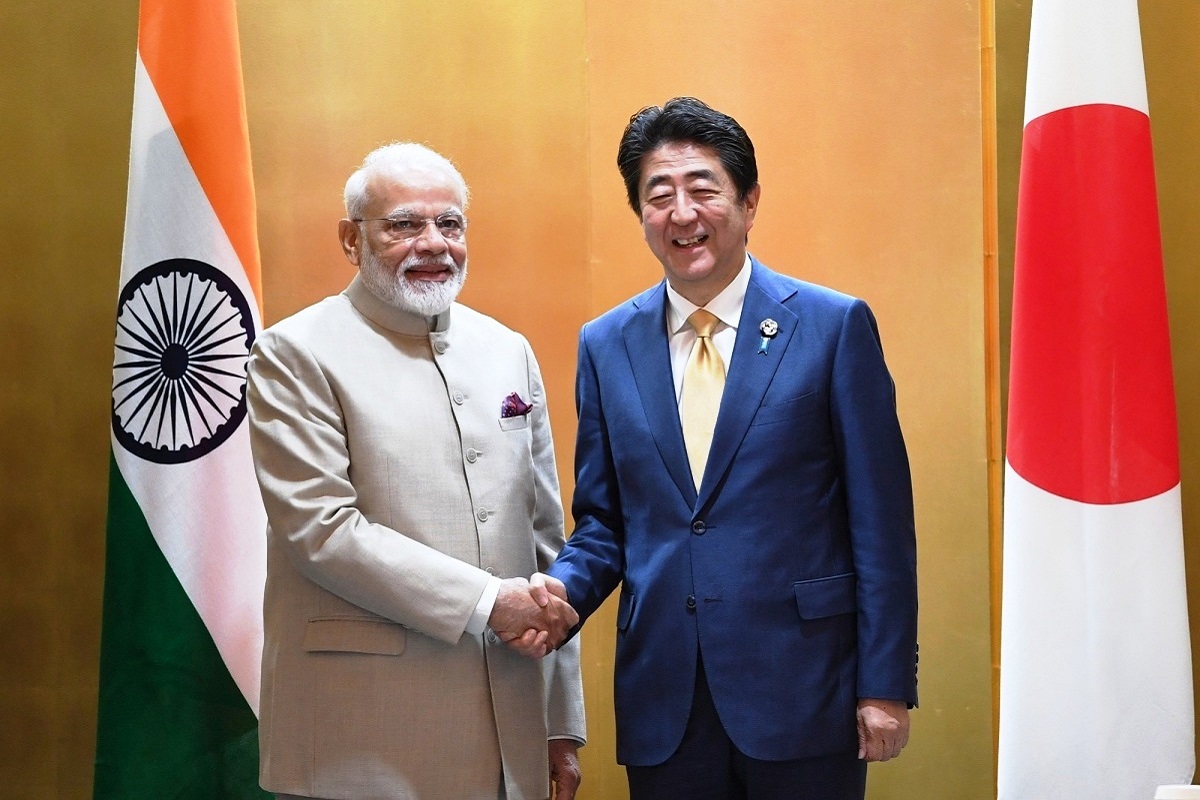Assam’s grand Jhumoir show: 8,000 performers, PM Modi to attend
Assam’s Jhumoir Binandini event on February 24 will feature over 8,000 performers showcasing the traditional Jhumoir dance at Sarusajai Stadium, Guwahati.
The two leaders also talked about the India-Japan-US trilateral format under which two Summit meetings have been held and agreed to continue such meetings as these have been positive.

Prime Minister Narendra Modi and Japan Prime Minister Shinzo Abe. (File Photo: PIB)
Prime Minister Narendra Modi and his Japanese counterpart Shinzo Abe on Thursday held bilateral talks on a number of areas including economic and defence sectors as the two leaders met on the sidelines of the fifth Eastern Economic Forum in Russia’s Vladivostok.
In a press conference, Foreign Secretary Vijay Gokhale announced the takeaways from the bilateral meet.
Advertisement
Modi and Abe discussed deepening multi-faceted ties in economic, defence and security, start-up and 5G areas and exchanged views on the regional situation.
Advertisement
Gokhale informed that India and Japan will have their first ‘2+2’ ministerial meeting before the visit of Japanese Prime Minister Shinzo Abe to India in December for the annual summit.
The ‘2+2’ is a format where Foreign Ministers and Defence Ministers of the two countries have a joint meeting to discuss strategic issues.
Briefing media persons on the talks between Modi and Abe, Foreign Secretary Vijay Gokhale said the Japanese Prime Minister referred to the recent visit by Indian Defence Minister Rajnath Singh to Japan where substantive issues were discussed.
Abe told Modi that those discussions could be taken forward during the Summit meeting in Delhi in December and there could be a possibility of concrete outcomes, Gokhale said.
The two leaders also discussed the possibility of India and Japan jointly undertaking projects in Africa.
They talked about the India-Japan-US trilateral format under which two Summit meetings have been held and agreed to continue such meetings as these have been positive.
Gokhale said the two leaders had a discussion on the Indo-Pacific region, an issue on which India and Japan share similar views.
“Prime Minister Abe spoke of a free and open Indo-Pacific and the importance of bilateral cooperation in that regard, both on the economic side and in terms of people-to-people relations to build a secure and prosperous Indo-Pacific region,” he said.
India, the US and several other world powers have been talking about the need to ensure a free, open and thriving Indo-Pacific in the backdrop of China’s rising military manoeuvring in the region.
In November last, India, the US, Australia and Japan had given shape to the long-pending Quadrilateral coalition to develop a new strategy to keep the critical sea routes in the Indo-Pacific free of Chinese influence.
China claims sovereignty over all of the South China Sea.
China is engaged in hotly contested territorial disputes in the East China Sea too with Japan. Beijing has built up and militarised many of the islands and reefs it controls in the region.
Both areas are stated to be rich in minerals, oil and other natural resources. They are also vital to global trade.
“Delighted to meet PM Shinzo Abe in Vladivostok. We had in-depth discussions on a wide range of subjects, particularly bettering trade and cultural relations between our nations. Our countries are also working together on various global forums to create a better planet,” Modi said in a tweet following the meet.
The meeting between prime minister Modi and Abe comes after they met at the G-20 Summit in Osaka in Japan and on the sidelines of the G7 Summit in Biarritz in France.
Modi also held bilateral meetings with his Malaysian counterpart Mahathir Mohamad and President of Mongolia.
Prime Minister Narendra Modi is on a two-day visit to Russia to participate in the 20th India-Russia annual summit and the fifth meeting of the Eastern Economic Forum (EEF), where he has been invited as the chief guest.
His visit to the Russian Far East Region is the first by an Indian prime minister.
The EEF is held annually with the objective of facilitating accelerated development of the Russian Far East’s economy and expanding international cooperation in the Asia-Pacific region.
Earlier on Wednesday, Prime Minister Narendra Modi and Russian President Vladimir Putin witnessed the exchange of 15 agreements ushering in new areas of cooperation including connectivity, deep-sea exploration, space, nuclear energy, among others, at the India-Russia 20th Annual Summit in Vladivostok.
Ahead of the exchange of MoUs, the two leaders discussed bolstering cooperation in trade and investment, oil and gas, mining, nuclear energy, defence and security, air and maritime connectivity, transport infrastructure, hi-tech, outer space and people-to-people ties.
Modi accompanied by Kremlin also visited the Zvezda shipbuilding facility on Wednesday, which is being expanded and has scope for foreign investment. The PM also interacted with the management and workers of the shipyard.
Advertisement